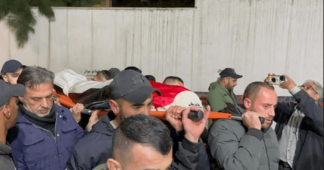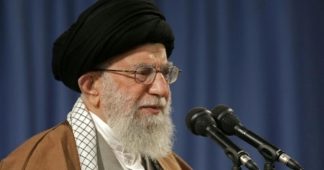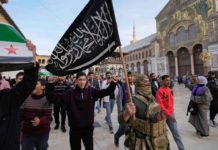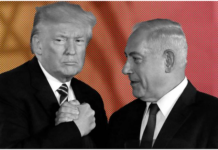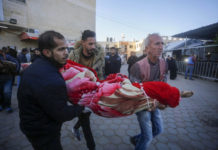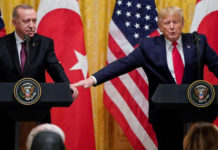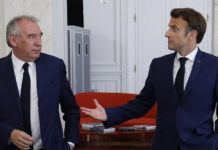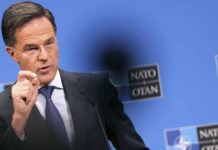By Jean Shaoul
Hours after the start of Monday’s criminal attack on Jenin in the northern West Bank, several thousand residents of the city’s densely populated refugee camp were forced to flee their homes, amid Palestinian claims that the military had threatened and forced camp residents to leave.
The offensive by Prime Minister Benjamin Netanyahu’s far-right government has killed at least 12 Palestinians, four of whom are children, and injured at least 120, including 20 in serious condition, in Israel’s biggest attack on a West Bank city in years.
Hundreds of Israel Defense Forces (IDF) bulldozers, under cover from aerial strikes from armed drones and helicopters, carried out acts of wanton vandalism. Their aim is to capture the armed groups resisting Israel’s decades-long, illegal occupation of the Palestinian territories and their arms caches, make life for the camp’s residents untenable and terrify and intimidate civilians throughout the West Bank.
Their actions are flagrant violations of the international conventions on war and human rights that outlaw military action against civilians.
The IDF flattened homes, residential buildings, medical facilities and mosques and ploughed up most of the streets surrounding the camp, leaving piles of rubble at the side of the roads that are now unusable, making it difficult if not impossible for humanitarian organisations to reach the camp’s remaining residents. Basic infrastructure, water, electricity and telephone networks, are in ruins. The residents, without access to the internet and social media, are cut off from the outside world.
In the evening, the IDF brought in re-enforcements to suppress the Palestinian militias and stationed snipers in the hollowed-out buildings, while its soldiers fired live bullets near a medical centre, injuring three people. More than 1,000 troops carried out searches to arrest members of the resistance groups, including Hamas, Islamic Jihad, Lions’ Den, the Popular Front for the Liberation of Palestine and others that Israel describes as “terrorists.” They have so far arrested 120 “wanted” Palestinians who are being interrogated by the security services.
The refugee camp, where some 14,000 people live in less than half a square kilometre, has been a centre of armed resistance to Israel’s brutal occupation that has attracted growing concern and nervousness among Israel’s Arab neighbours, all of whom are sitting atop social tinder boxes. Netanyahu, speaking at an IDF base commanding the Jenin operation, showered praise on the soldiers, signaled the end of the current operation and promised further attacks. “In these moments we are completing the mission, and I can say that our broad action in Jenin is not a one-time thing. We will continue as much as necessary to cut off terrorism.”
The leaders of Israel’s various opposition parties all voiced their support for the government’s war crimes, indicating how little their policies differed from those of Netanyahu and his fascist ministers.
As the operation in Jenin intensified, Hussein Khalaylah, a 20-year-old Palestinian from the southern West Bank town of Samua, rammed his car into a group of pedestrians in a residential area of Tel Aviv, before giving chase to passers-by with a knife and leaving seven people injured, three seriously. Hamas, the militant clerical group that controls Gaza, said later Khalaylah was one of its members.
An armed civilian shot and killed Khalaylah, which Israeli security officials chillingly described as “neutering” the assailant. National Security Minister Itamar Ben Gvir said that the attack vindicated his legislative drive to enable more Israelis to carry guns.
Yaakov Shabtai, Israel’s police chief, told reporters, “We’ve assessed that because of our activity in Judea and Samaria [the biblical name for the West Bank], the motivation and potential for attacks would rise.” Far from protecting the lives of Jewish Israelis, the IDF’s murderous campaign against the Palestinians has indeed endangered them.
Israel has carried out near-daily military raids in the West Bank, killing 190 Palestinians in the West Bank and Gaza since Netanyahu took office at the end of last year, announced the construction of 13,000 new homes in the settlements and expanded the settlements deemed illegal under Israeli law. Settlers have been allowed to carry out pogrom-like attacks on Palestinian towns and villages, under the protection of the Israeli army. At the same time, Israel has withheld the taxes and revenues collected on behalf of the Palestinian Authority (PA), leaving the PA unable to pay its workforce or provide any assistance and support as social conditions deteriorate.
Netanyahu and his fascist-dominated coalition have deliberately stoked war, targeting the Palestinians in the Occupied Territories, Israel’s Arab citizens and neighbouring states, above all, Iran and Syria, in the face of widespread opposition to their plans to assume dictatorial powers by emasculating an already largely compliant judiciary.
Netanyahu’s war plans, irrespective of his conjunctural disagreements with the Biden administration, were greenlighted by Washington. None of Tel Aviv’s war crimes against the Palestinians—the self-same ones that the Washington accuses Russia of having committed in Ukraine—could have been carried out without Biden’s say-so.
Israel has admitted that it informed the US of its intention of carrying out the operation in Jenin and evidently met no opposition to its plans. On Monday, the White House National Security Council stated, “We support Israel’s security and right to defend its people against Hamas, Palestinian Islamic Jihad, and other terrorist groups.”
The previous day, Israel’s Defence Ministry announced it is to buy 25 F-35 aircraft from the US, in a deal that increases Israel’s arsenal of the stealth fighter jets from 50 to 75 by 2026-27. The $3 billion purchase, to be financed through American military aid to Israel, with the planes produced by Lockheed Martin and Pratt & Whitney in conjunction with Israeli companies, means that Israel will be the only country in the Middle East to fly the world’s most advanced fighter jet. The F-35’s stealth technology makes it more able to strike targets with impunity throughout the region and outwit Iran’s Russian-built S-300 anti-aircraft missile defense system, and possibly even the S-400 system.
The announcement follows last January’s request for 25 F-15 EX Boeing fighters from the US and November’s agreement to purchase four Boeing KC-46A midair refueling aircraft, both of which would enhance Tel Aviv’s capabilities against Tehran.
The move to expand Israel’s arsenal comes as tensions between Israel and Iran are escalating. It is part of US imperialism’s broader preparations for a possible war against Iran and its allies in Syria and Lebanon. Netanyahu has already used its F-35 jets to shoot down Iranian drones and has threatened to carry out strikes on Iranian nuclear targets.
Israel has assassinated several Iranian nuclear experts, attacked and sabotaged several facilities inside Iran and waged a covert war—aerial and maritime—against Tehran and its allies, striking Syria in almost weekly attacks with the US providing intelligence and military support.
The nuclear issue has long been a smokescreen, with the major powers, the International Atomic Energy Authority and the CIA all admitting that there has been no evidence of Iran having any type of nuclear weapons programme since 2003, as the current CIA director and former deputy secretary of state William Burns acknowledged in his autobiography.
The Biden administration had initially hoped to use the renewal of the 2015 nuclear deal as a means of detaching Iran from Russia and China and opening up additional energy supplies to Europe. But under President Ebrahim Raisi, who hails from Iran’s conservative faction opposed to the 2015 deal, Tehran has sought to take advantage of the Russia-Ukraine war and western sanctions on Russia to stress Iran’s importance as a transport hub connecting China and Central Asia with Europe and Russia with India. It has signed several transport projects even as it has opened back-channel talks with Washington to secure some relief from the sanctions that have crippled its economy.
In March, China brokered an agreement between Saudi Arabia, until recently a staunch US ally, and Iran, following years of fierce competition for influence throughout the Middle East. Syria, a key Iranian ally whose president, Bashar al-Assad, Riyadh had sought to overthrow by funding and arming Islamist proxies, has been welcomed back into the Arab League.
In May, Tehran and Moscow signed a $1.6 billion railway deal to develop the International North–South Transport Corridor as a rival to the Suez Canal. On Friday, Russian Foreign Minister Sergei Lavrov announced that Iran will be admitted to the Shanghai Cooperation Organization (SCO) as a full member next month, strengthening Tehran’s links to China and Russia amid international isolation and sanctions.
